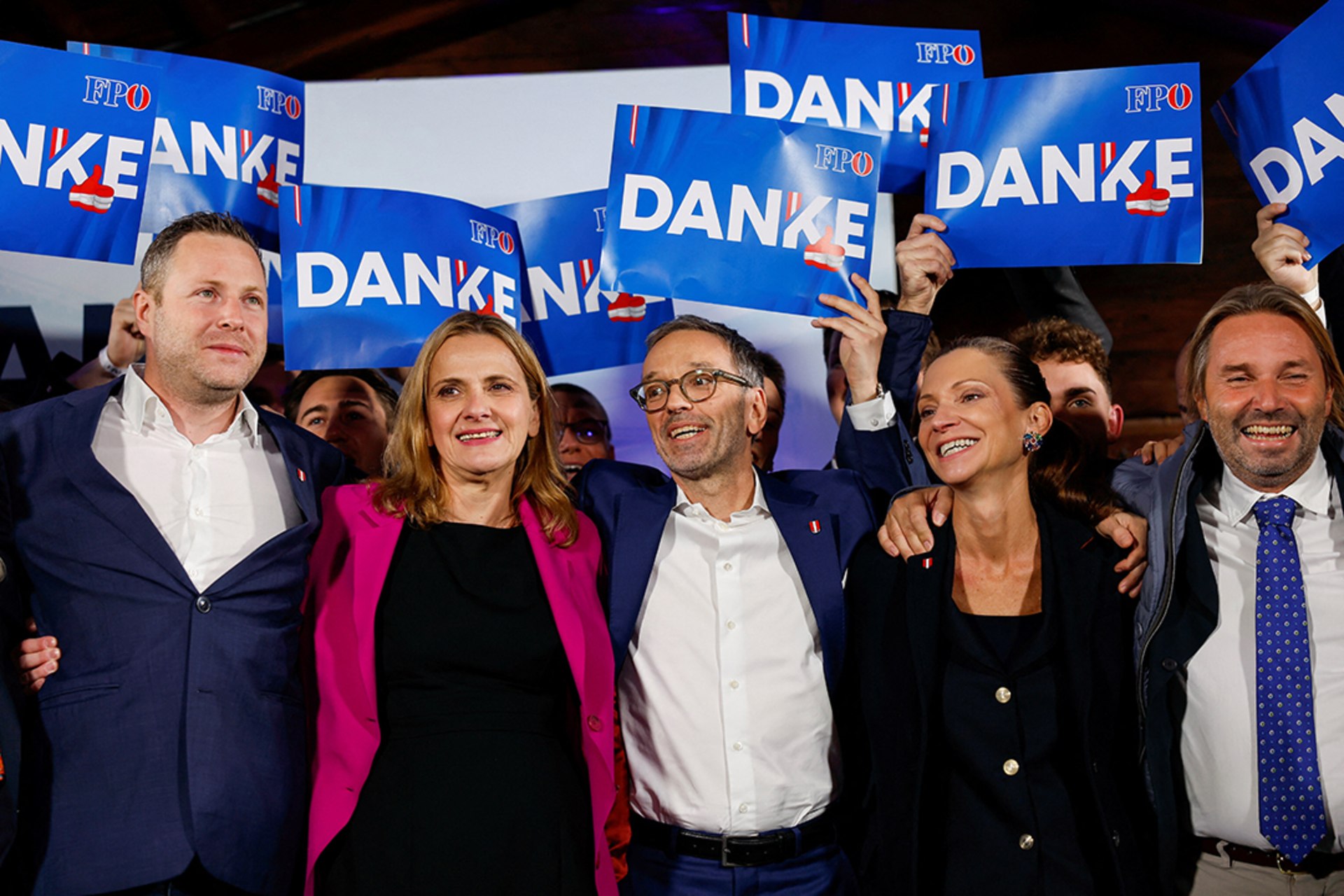How Far-Right Election Gains Are Changing Europe
Far-right parties are making significant strides in Austria and Germany, pulling EU policies in a rightward direction.

Liana Fix is a fellow for Europe at the Council on Foreign Relations. Sophia Winograd is an intern for CFR’s Europe Program.
Advances by right-wing parties in recent elections in Austria and Germany could have a destabilizing effect on domestic politics, as well as normalize anti-migrant and Euroskeptic viewpoints in European politics. Mainstream parties are seeking new coalitions to keep radical parties out of power, but European Union (EU) migration policy is already moving toward tighter border measures throughout the region as well as an increase in deportation of asylum seekers. The changes also signal possible tougher debates on aid for Ukraine.
What does the far-right victory in Austria mean?
In September elections, Austria’s far-right Freedom Party (FPÖ) secured the highest percentage of the outcome for the first time in the country’s history. Winning 29 percent of the vote, the FPÖ came ahead of both the conservative Austrian People’s Party (ÖVP) and the center-left Social Democratic Party (SPÖ) with 26 and 21 percent, respectively. The FPÖ has been part of Austrian coalition governments three times in the past, pointing to its increasingly widespread normalization in Austrian politics.
The anti-migrant, anti-Islam, and Euroskeptic FPÖ is known as the “grandfather” of modern European far-right parties, having been founded in 1956 by a leader who had been an SS officer and Nazi lawmaker. As outlined in its election platform “Fortress Austria,” the Freedom Party seeks the “remigration of uninvited foreigners,” opposes the European Union’s sanctions on Russia, rejects sending further aid to Ukraine, and calls for Austria to reclaim certain powers that have been delegated to the EU.
Falling short of an absolute majority, the party would need a coalition partner to govern, possibly the conservative ÖVP. The alternative would be a governing coalition that excludes the FPÖ, likely one comprised of the People’s Party, the Social Democrats, and the liberal Neos or Greens. Typically, forming a coalition takes two to three months; however, given the historic nature of the far-right’s win, the process this time around could be delayed.
In 2000, the EU’s response to the FPÖ’s first entry into government was hard-nosed, with Brussels leveling sanctions on Austria. That is difficult to imagine today given the various far-right parties in power in European countries. That trend reveals a new reality: some of the once-radical ideas of the far-right have become mainstream, such as broad deportation of asylum-seekers, and the once-shunned parties now have a chance to exert real influence in Europe.
What does the far-right surge in Germany’s regional elections mean?
Another historic right-wing shift occurred in Germany in September. In the eastern state of Thuringia, the far-right Alternative for Germany (AfD) won a state election for the first time since World War II. It also achieved record results in the eastern states of Brandenburg and Saxony. The center-left Social Democratic Party (SPD) of Chancellor Olaf Scholz still came out as the winner in Brandenburg, even if narrowly, with 31 percent of the vote. The SPD win in Brandenburg was critical, as a defeat would have sparked debate about Chancellor Scholz’s chances to be the lead candidate for the Social Democrats in the next federal elections in September 2025.
In contrast to the FPÖ’s long history, the AfD is a relatively new party. Founded in 2013, it gained support after adopting a xenophobic and Islamophobic stance during the refugee crisis in 2015. Since then, the further radicalization of the party has caused the domestic intelligence agency to place the party’s branches in Saxony and Thuringia under official surveillance as “proven right-wing extremist” groups.
The AfD’s outright victories in those eastern states have made building governing coalitions there complicated. To keep the AfD out, the centrist political parties will have to work with a new far-left populist party, Sahra Wagenknecht Alliance (BSW), which aligns with the far-right positions on migration and support for Ukraine.
The AfD is strongest in the formerly Communist-run eastern states in Germany, but it is also currently polling second nationally, hinting at what might be in store for the federal elections next year. The regional results have further eroded cohesion within Scholz’s precarious three-party coalition between the SPD, the Greens, and the center-right Free Democratic Party. It could even call into question the coalition’s ability to continue governing until the 2025 elections.
What are the implications for policymaking in the EU?
Victories by extremist or populist right-wing parties on the national or subnational level affect the European political landscape—either through direct votes in the European Council by far-right leaders in government, such as in Hungary and Italy, or because domestic instability, such as in France or Germany, leaves the EU paralyzed and leaderless at a time when key allies such as the United States are looking to Brussels for action. While the rightward shift in the European parliamentary elections in June was initially less stark than predicted, two far-right alliances are now the third- and fourth-largest groupings in the parliament.
One of the most significant implications of the far-right surge in Europe, though, has been its normalization in contemporary politics. Many European centrist mainstream parties have begun adopting some of the hardline policies, especially migration, being pushed by parties such as the AfD and FPÖ because they see those messages resonating with large sections of the public. In turn, the EU is also following a rightward curve on migration, including an April 2024 overhaul of migration policies to allow for tougher border measures and expedited deportations of asylum seekers.
This publication is part of the Diamonstein-Spielvogel Project on the Future of Democracy.
This work represents the views and opinions solely of the authors. The Council on Foreign Relations is an independent, nonpartisan membership organization, think tank, and publisher, and takes no institutional positions on matters of policy.
